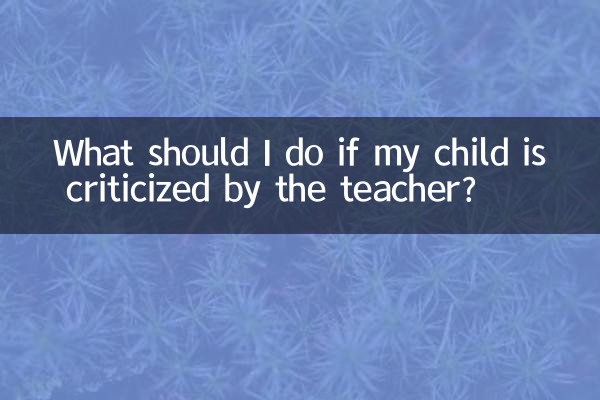What should I do if my child is criticized by the teacher?
In the past 10 days, discussions on education topics have remained high across the Internet, especially the topic of "children being criticized by teachers", which has attracted widespread attention. Parents often feel anxious and helpless when their children are criticized. This article will analyze recent hot topics through structured data and provide practical suggestions to help parents handle this issue correctly.
1. Inventory of recent popular education topics

| Ranking | topic | heat index | Main discussion points |
|---|---|---|---|
| 1 | The child was criticized by the teacher | 9.8 | Parental coping methods and psychological counseling |
| 2 | school bullying | 9.5 | Preventive measures and treatment methods |
| 3 | Implementation of double reduction policy | 9.2 | Policy effects, parent feedback |
| 4 | family education law | 8.7 | Legal responsibilities, education methods |
2. Common reactions of children when they are criticized
| reaction type | Proportion | Typical performance |
|---|---|---|
| Cry with grievance | 42% | Feeling depressed and unwilling to go to school |
| resist resistance | 28% | Conflict with the teacher and refuse to admit mistakes |
| Accept silently | 20% | Obedient on the surface but dissatisfied on the inside |
| Don't care attitude | 10% | Has nothing to do with oneself and lacks willingness to correct |
3. The correct way for parents to handle
1.keep Calm: First, control your emotions and avoid showing excessive anger or anxiety in front of your children.
2.know the facts: Listen patiently to the child as he tells what happened, and at the same time communicate with the teacher to obtain comprehensive information.
3.Correct guidance: Help children analyze the reasons for criticism and distinguish between reasonable criticism and inappropriate accusations.
| type of criticism | coping strategies |
|---|---|
| reasonable criticism | Teach children to accept humbly and correct mistakes |
| misunderstanding criticism | Teach children to explain politely and clarify facts |
| inappropriate criticism | Parents should take the initiative to communicate with teachers to protect their children’s rights and interests |
4.psychological counseling: Pay attention to children's emotional changes and help release stress through games, paintings, etc.
5.Develop frustration resistance: Teach children to view criticism correctly and regard it as an opportunity for growth rather than a blow.
4. Expert advice
Professor Li, an expert in educational psychology, pointed out: "Criticism is an inevitable part of the education process, and the key lies in how to transform it. Parents should do the following:
1. Don’t defend your shortcomings and don’t follow blindly. Analyze the essence of the problem objectively.
2. Establish a home-school communication mechanism to form an educational synergy
3. Pay attention to daily education and cultivate children’s sense of responsibility.”
5. Common misunderstandings among parents
| Misunderstanding | Proportion | negative impact |
|---|---|---|
| overprotective | 35% | Children lack a sense of responsibility |
| simple scolding | 28% | Parent-child relationship is tense |
| Don't care at all | 20% | Problem worsens |
| Blindly take sides | 17% | Educational effect discount |
6. Practical tips
1.Role playing method: Help children practice the correct way to deal with criticism through simulated scenarios.
2.Growth diary: Record criticism incidents and improvement process, so that children can see their progress.
3.mood thermometer: Teach children to evaluate emotional intensity on a scale of 1-10 and develop their emotional management abilities.
4.positive feedback: When children handle criticism correctly, give them timely affirmation and encouragement.
Conclusion
Criticism is an important learning opportunity for children as they grow. Parents guiding their children with a peaceful attitude and scientific methods can not only help solve current problems, but also cultivate their children's courage and ability to face setbacks. Remember, the goal is not to prevent children from ever being criticized, but to teach them how to thrive from criticism.

check the details

check the details